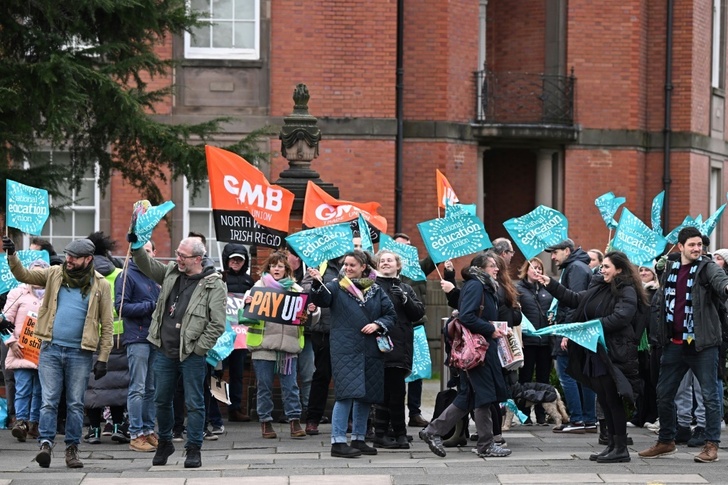Half a million workers went on strike in Britain on Wednesday, calling for higher wages in the largest such walkout in over a decade, closing schools and severely disrupting transport.
Europe is battling a cost-of-living crisis and the latest strikes come a day after more than 1.27 million took to the streets in France, upping pressure on the French government over pension reform plans.
Britain's umbrella labour organisation the Trades Union Congress (TUC) called it the "biggest day of strike action since 2011". Teachers and train drivers were among the latest groups to act, as well as border force workers at UK air and seaports.
"We are striking because for the past 10 years we had effectively had a pay cut," said job centre worker and union representative Graham, who preferred not to give his last name.
"Some of our members, even though they are working, still have to make visits to food banks," he told AFP.
"Not only are wages not keeping up, but things like fares, council tax and rents are going up. Anything we get is eaten away."
Britain has witnessed months of strikes by tens of thousands of workers -- including postal staff, lawyers, nurses and employees in the retail sector -- as UK inflation raced above 11 percent, the highest level in more than 40 years.
- 'No magic wand' -
At London's King's Cross rail station, Kate Lewis, a 50-year-old charity worker, said she sympathised with the strikers despite her train being delayed.
"I understand. We are all in the same boat. All impacted by inflation," she said.
But government and company bosses are standing firm over wage demands.

Union boss Mark Serwotka said the government's position was "unsustainable".
"It's not feasible that they can sit back with this unprecedented amount of industrial action growing, because it's half a million today," he told Sky News.
"Next week, we have paramedics, and we have nurses, then will then be the firefighters," he added, warning that unions were prepared to strike throughout the summer.
"Nothing would give me more pleasure than, to wave a magic wand and have all of you paid lots more," British Prime Minister Rishi Sunak told public health workers on Monday.
- Nationwide rallies -
"An important part of us getting a grip of inflation and halving it is making sure the government's responsible with its borrowing," he said.
"If that gets out of control that makes it worse and it's about making pay settlements reasonable and fair," Sunak added.
The latest official data shows 1.6 million working days were lost from June-November last year because of strikes -- the highest six-month total in more than three decades -- according to the Office for National Statistics (ONS).
A total of 467,000 working days were lost to walkouts in November alone, the highest level since 2011, the ONS added.
Alongside the strikes, unions are also staging rallies across the country against the Conservative government's plans to legislate against public sector strike action.

Sunak has introduced a draft law requiring some frontline workers to maintain a minimum level of service during walkouts.
The prime minister has defended the plans as "reasonable" and in line with other European countries.
burs/jwp/am
© Agence France-Presse
Your content is great. However, if any of the content contained herein violates any rights of yours, including those of copyright, please contact us immediately by e-mail at media[@]kissrpr.com.
Source: Story.KISSPR.com

